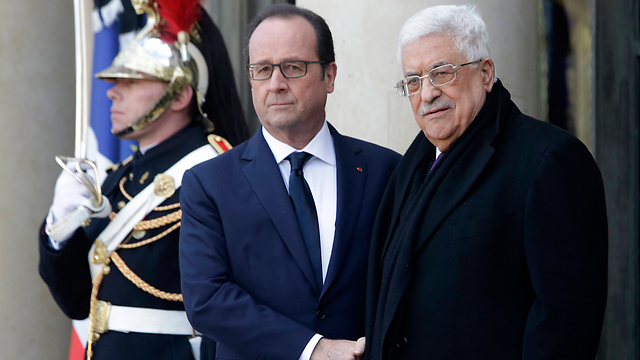
Abbas and Hollande
Photo: AP

Paris draft won't recognize changes to pre-1967 lines without mutual agreement
According to a draft statement, the Paris summit will urge Israel and the Palestinians ‘to officially restate their commitment to the two-state solution,’ won’t recognize changes to pre-1967 borders without agreement negotiated by warring parties.
In a strong message to Israel and the incoming Trump administration, dozens of countries are expected this weekend to reiterate their opposition to Israeli settlements and call for the establishment of a Palestinian state as "the only way" to ensure peace in the region.
France is hosting more than 70 countries on Sunday at a Mideast peace summit, in what will be a final chance for the Obama administration to lay out its positions for the region.
According to a draft statement obtained by The Associated Press on Friday, the conference will urge Israel and the Palestinians "to officially restate their commitment to the two-state solution."
It also will affirm that the international community "will not recognize" changes to Israel's pre-1967 lines without agreement by both sides.
The draft says that participants will affirm "that a negotiated solution with two states, Israel and Palestine, living side by side in peace and security, is the only way to achieve enduring peace."
Israel has settled some 600,000 of its citizens in the West Bank and eastern Jerusalem which Palestinians for a future independent state. Israel captured both areas in the 1967 Six-Day War after surrounding Arab armies threatened to attack, or did attack, Israel.
The summit comes on the heels of a UN Security Council resolution last month that condemned the settlements as illegal. Israel reunited Jerusalem shortly after the Six-Day War when it annexed the eastern half. The resolution passed 14-0 after the United States declined to use its traditional veto power and instead abstained.
Israeli Prime Minister Benjamin Netanyahu has ruled out a return to the 1967 lines, and many members of his coalition oppose Palestinian independence and support expanded settlements both on ideological and security grounds.
Netanyahu has rejected the UN resolution and accuses the Obama administration of conspiring behind Israel's back. Israel has refused to participate in the French conference, which Netanyahu on Thursday claimed was "rigged" against his country, and would not be conducive to peace.
The Palestinians, who also are not invited to this weekend's conference, have welcomed the French initiative. In recent years, they have campaigned for the international community to assume a greater role in resolving the conflict.
Palestinian Authority President Mahmoud Abbas is expected to visit France in the coming weeks to follow up on the conference.
Netanyahu rejects international attempts to "impose" a solution and says peace can only be reached through direction negotiations.
On Thursday, French President Francois Hollande said the conference aims at ensuring the support of the international community for the two-state solution as a reference for future direct negotiations.
"I cannot accept the status quo, letting people think that the conflict would resolve itself. It is not true. That is why France took the initiative of a conference on Middle East," Hollande said. "The objective is to reaffirm the support of the international community to the two-state solution and ensure that this solution remains the reference. But I see that has weakened, on the ground and in the minds (of the people). If we let it decay, it would be a risk for the security of Israel.
French diplomats, speaking on condition of anonymity because they were not authorized to talk to the media about the event, said the timing of the conference—days before US President-elect Donald Trump's inauguration—is intentional and meant to present him with a collective international push for peace once he takes office.
Trump has not yet laid out a clear policy for the region, but has signaled he will be more sympathetic to Israel's hard-line right than previous administrations. While indicating an eagerness to broker a peace agreement, his election platform did not mention a Palestinian state.
Trump has appointed David Friedman, a Jewish-American lawyer with close ties to the settlement movement, as his ambassador to Israel. Trump also has vowed to move the embassy from Tel Aviv to Jerusalem, a step the Palestinians strongly oppose.
In their confirmation hearings, Trump's Cabinet picks have voiced mixed messages. His nominee for secretary of state, Rex Tillerson, said a two-state solution is "the dream that everyone is in pursuit of," but he also questioned its feasibility.
















